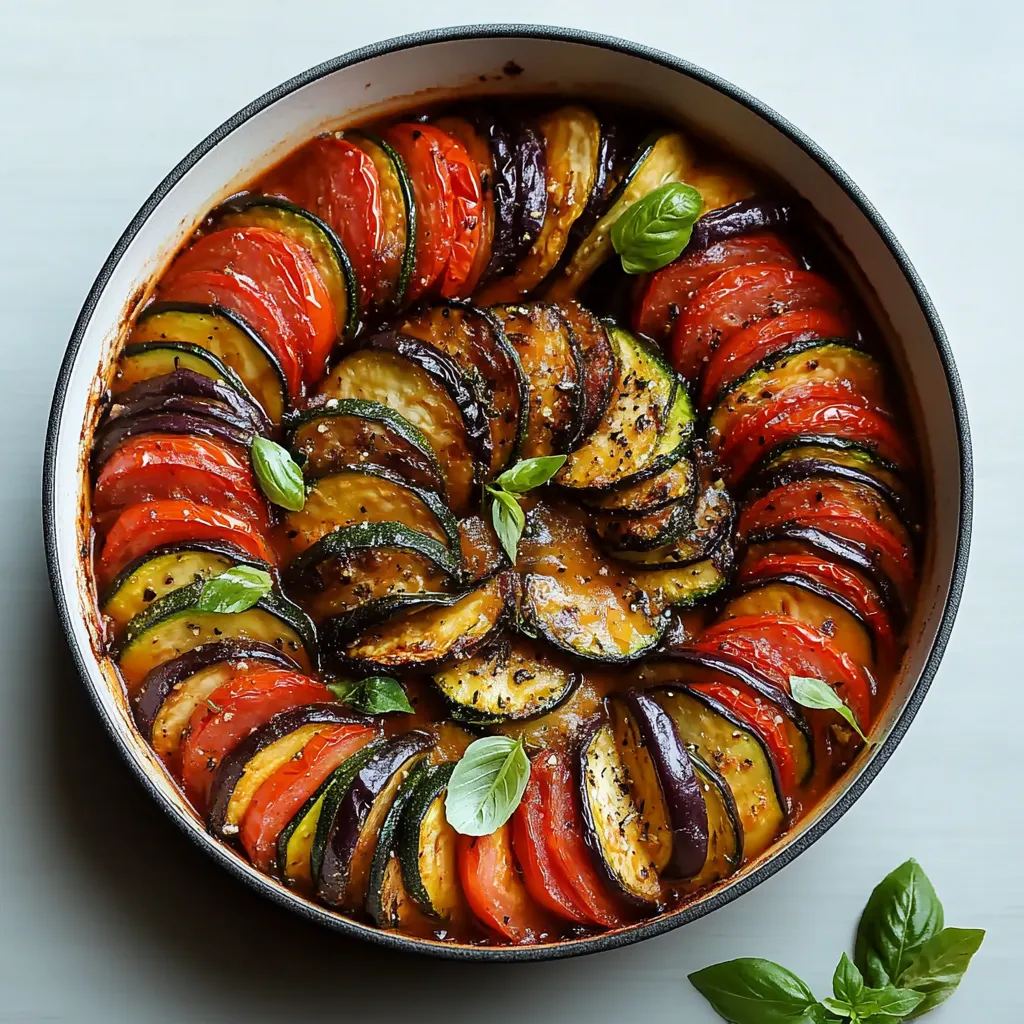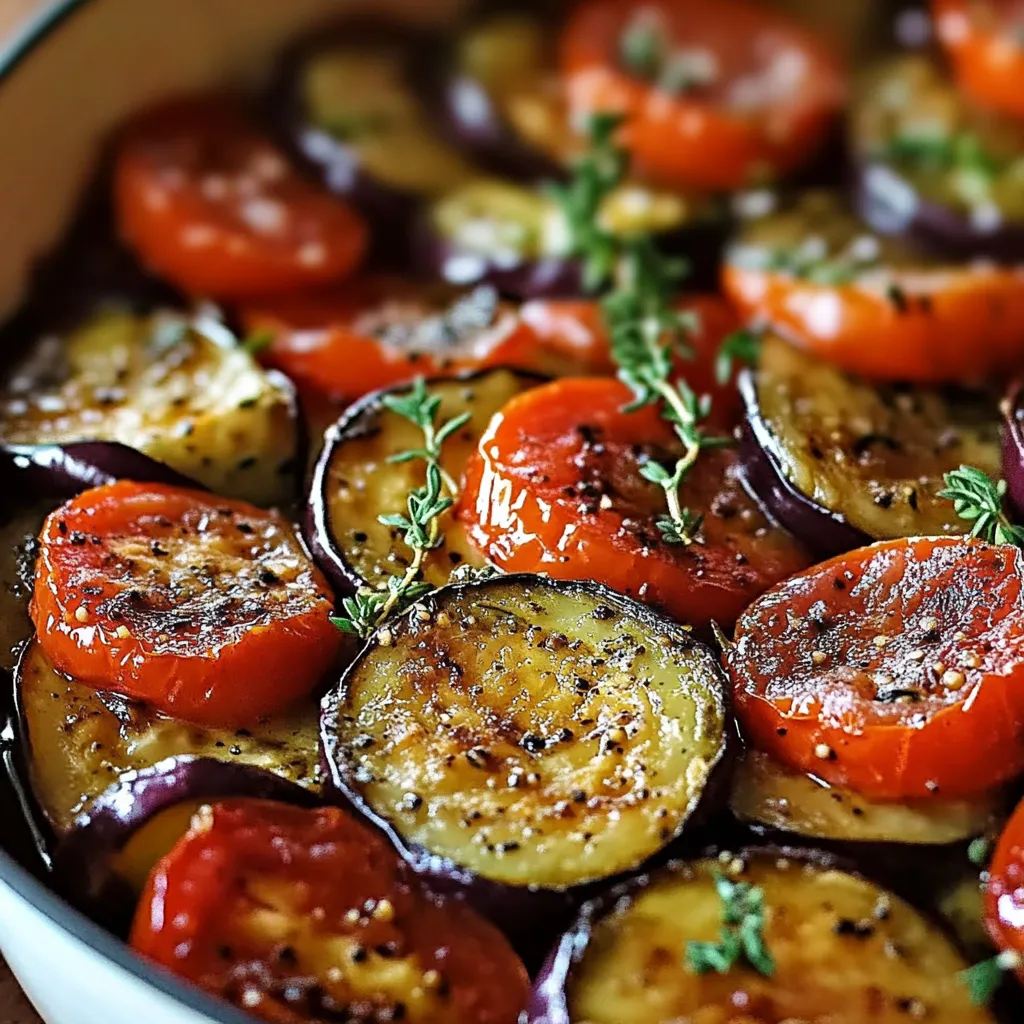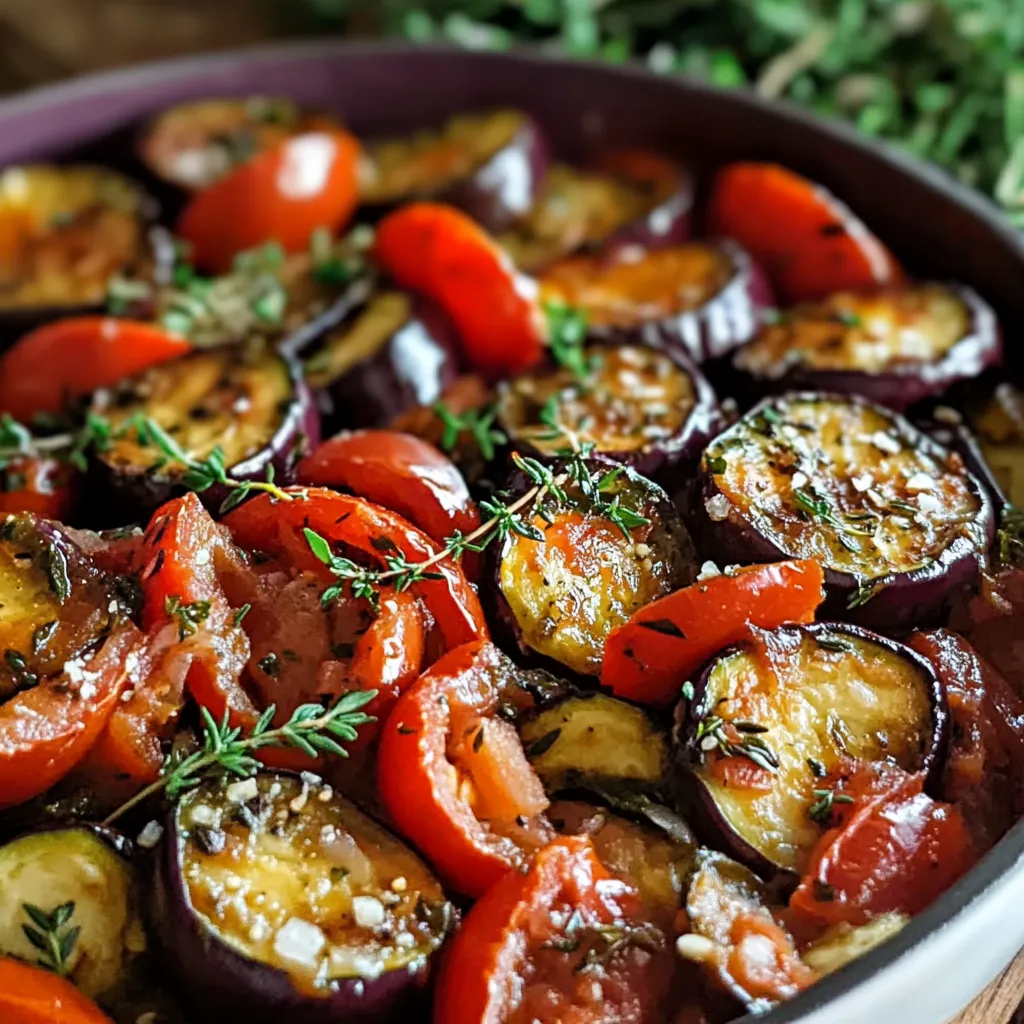 Pin it
Pin it
This classic French ratatouille recipe brings the sunny flavors of Provence right to your table. A medley of summer vegetables – eggplant, zucchini, bell peppers, and tomatoes – are slowly simmered with aromatic herbs to create a dish that's both comforting and elegant.
My grandmother taught me this recipe during summer visits to southern France. The smell of these vegetables slow-cooking still transports me to her sun-drenched kitchen where I first learned to appreciate the simple elegance of Provençal cooking.
Ingredients
- Eggplants: Bring a meaty texture and absorb all the wonderful flavors in the dish
- Zucchini: Adds a gentle sweetness; look for firm, small to medium ones
- Red bell peppers: Provide vibrant color and natural sweetness; choose ones that feel heavy for their size
- Ripe tomatoes: Deliver essential acidity and moisture; garden fresh makes a noticeable difference
- Onion: Creates the aromatic foundation; yellow or white work equally well
- Garlic: Infuses everything with essential flavor; use fresh cloves, not pre-minced
- Olive oil: Binds the flavors together; a good quality extra virgin makes all the difference
- Fresh herbs: Especially thyme and basil are non-negotiable for authentic flavor
- Bay leaves: Add subtle depth; remove before serving
Step-by-Step Instructions
- Prepare The Base:
- Heat olive oil in a large heavy bottomed pot over medium heat until it shimmers but doesn't smoke. Add onions and garlic, cooking slowly until they become translucent and fragrant, about 5 minutes. Stir frequently to prevent browning as we want sweet, not caramelized flavors.
- Cook The First Vegetables:
- Add eggplant and bell peppers to the pot. These vegetables take longer to soften, so they go in first. Cook for 8 to 10 minutes, stirring occasionally to ensure even cooking. The eggplant will start to absorb the oil and collapse slightly, which is exactly what we want.
- Add The Zucchini:
- Introduce the zucchini to the pot next. These cook more quickly than eggplant, so adding them later prevents them from becoming mushy. Cook for another 5 minutes, stirring gently to incorporate them with the other vegetables.
- Complete The Dish:
- Add tomatoes, thyme, basil, and bay leaves, creating the fragrant sauce that will bring everything together. Season with salt and pepper, keeping in mind that the flavors will concentrate as it cooks. The tomatoes will release their juices, creating a rich, flavorful base.
- Gentle Simmer:
- Reduce heat to low, cover the pot, and allow everything to simmer together for 30 to 40 minutes. Stir occasionally but gently to prevent the vegetables from breaking down completely. We want them tender but still maintaining their individual identity.
- Rest And Serve:
- Remove from heat and let stand for at least 30 minutes. This resting period is crucial as it allows the flavors to meld together. Adjust seasoning if necessary and remove bay leaves before serving. Ratatouille is often better the next day after the flavors have had time to develop fully.
 Pin it
Pin it
The tomatoes are truly the secret hero of this dish. My grandmother taught me to save a few of my ripest garden tomatoes specifically for ratatouille. Once I made the mistake of using unripe tomatoes and the dish lacked that distinctive sweet-acidic balance that makes a truly great ratatouille.
Serving Suggestions
Ratatouille shines as a versatile dish that adapts to any meal. Serve it alongside grilled fish or chicken for a complete protein-rich dinner. For a traditional French experience, pair it with crusty baguette to soak up the flavorful juices. It also works beautifully over polenta or folded into an omelet for breakfast.
During summer months, I often serve it at room temperature drizzled with a little extra virgin olive oil and scattered with fresh basil leaves. In winter, warming it gently transforms it into a comforting meal that feels like sunshine on a plate.
Storage and Reheating
Ratatouille actually improves with time as the flavors continue to develop and meld together. Store in an airtight container in the refrigerator where it will keep for up to 5 days. When reheating, do so gently over low heat to preserve the texture of the vegetables. Add a splash of water if needed to prevent sticking.
For longer storage, freeze in portion-sized containers for up to 3 months. Thaw overnight in the refrigerator before gently reheating. The texture may change slightly after freezing, but the flavor remains delicious.
Traditional Variations
While this recipe follows the classic French approach, regional variations exist throughout Provence. Some versions layer the vegetables in a baking dish and roast them for a more concentrated flavor. Others include potatoes or artichokes for heartier versions.
In Nice, they often add a pinch of saffron and olives for their famous "Ratatouille Niçoise" variation. Some families guard secret ingredients jealously—my grandmother would sometimes add a splash of balsamic vinegar at the very end, though she would deny this if asked directly by other French cooks!
 Pin it
Pin it
Frequently Asked Questions
- → What vegetables are commonly used in ratatouille?
Common vegetables include eggplants, zucchinis, bell peppers, tomatoes, and onions. These create the dish's signature flavors.
- → Can I make ratatouille ahead of time?
Yes, ratatouille often tastes better when made ahead of time, as the flavors deepen and meld together after resting.
- → How should I serve ratatouille?
Ratatouille can be served as a side dish, a main course with crusty bread or rice, or even as a topping for pasta.
- → Can ratatouille be frozen?
Yes, ratatouille freezes well. Store it in airtight containers or freezer bags for up to 3 months.
- → What herbs are ideal for flavoring ratatouille?
Fresh thyme, basil, and bay leaves are traditional. You can also experiment with rosemary or herbes de Provence.
- → Is ratatouille served hot or cold?
Ratatouille can be enjoyed hot, warm, or even cold, depending on your preference or the occasion.
